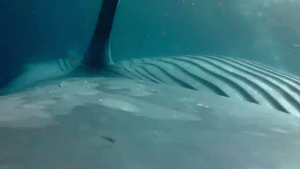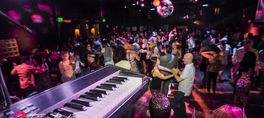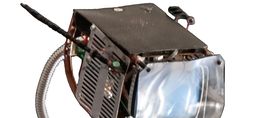Thu September 29, 2016
Please Join SF Bay ACS for: "Insights into Rorqual Lunge-feeding Behavior Gleaned From New Video and Accelerometry Tags"
SEE EVENT DETAILS
at Bay Model
(see times)
For nearly all of human existence on the sea, our understanding of whales has been limited to what we can observe at the surface. For fully aquatic animals such as these, however, time spent on the surface is really a tiny fraction of the life cycle of these largest predators on the planet. Basic questions about feeding behavior and ecology have only begun to be answered in Sept 2016 whale tailthe last fifteen years with the advent of animal-borne sensors capable of logging cetacean behavior underwater. Only in the last two years have sensors that measure orientation and motion been combined with high-quality video cameras to provide us with a whale’s eye view of the feeding events that are so critical to overall population recovery from 20th century lows. Please join us as we explore new insights into the feeding behavior of humpback whales from five oceans, fin whales from the Atlantic and blue whales from right here in California.
Biography:
David Cade spent 12 years as an educator (6 in the great outdoors and 6 in a math classroom) David Cade Sept 2016before returning to science to pursue his passions. After earning a master’s degree in education at Stanford University in 2005 and a master’s in oceanography at Oregon State University in 2014, Cade is now in the midst of his Ph.D. work in Jeremy Goldbogen’s lab at Stanford University’s Hopkins Marine Station.
https://www.facebook.com/events/189477701418257/
show less
Biography:
David Cade spent 12 years as an educator (6 in the great outdoors and 6 in a math classroom) David Cade Sept 2016before returning to science to pursue his passions. After earning a master’s degree in education at Stanford University in 2005 and a master’s in oceanography at Oregon State University in 2014, Cade is now in the midst of his Ph.D. work in Jeremy Goldbogen’s lab at Stanford University’s Hopkins Marine Station.
https://www.facebook.com/events/189477701418257/
For nearly all of human existence on the sea, our understanding of whales has been limited to what we can observe at the surface. For fully aquatic animals such as these, however, time spent on the surface is really a tiny fraction of the life cycle of these largest predators on the planet. Basic questions about feeding behavior and ecology have only begun to be answered in Sept 2016 whale tailthe last fifteen years with the advent of animal-borne sensors capable of logging cetacean behavior underwater. Only in the last two years have sensors that measure orientation and motion been combined with high-quality video cameras to provide us with a whale’s eye view of the feeding events that are so critical to overall population recovery from 20th century lows. Please join us as we explore new insights into the feeding behavior of humpback whales from five oceans, fin whales from the Atlantic and blue whales from right here in California.
Biography:
David Cade spent 12 years as an educator (6 in the great outdoors and 6 in a math classroom) David Cade Sept 2016before returning to science to pursue his passions. After earning a master’s degree in education at Stanford University in 2005 and a master’s in oceanography at Oregon State University in 2014, Cade is now in the midst of his Ph.D. work in Jeremy Goldbogen’s lab at Stanford University’s Hopkins Marine Station.
https://www.facebook.com/events/189477701418257/
read more
Biography:
David Cade spent 12 years as an educator (6 in the great outdoors and 6 in a math classroom) David Cade Sept 2016before returning to science to pursue his passions. After earning a master’s degree in education at Stanford University in 2005 and a master’s in oceanography at Oregon State University in 2014, Cade is now in the midst of his Ph.D. work in Jeremy Goldbogen’s lab at Stanford University’s Hopkins Marine Station.
https://www.facebook.com/events/189477701418257/
show less
Date/Times:
Bay Model
2100 Bridgeway, Sausalito, CA 94965
The Best Events
Every Week in Your Inbox
From Our Sponsors
UPCOMING EVENTS
Great suggestion! We'll be in touch.
Event reviewed successfully.









